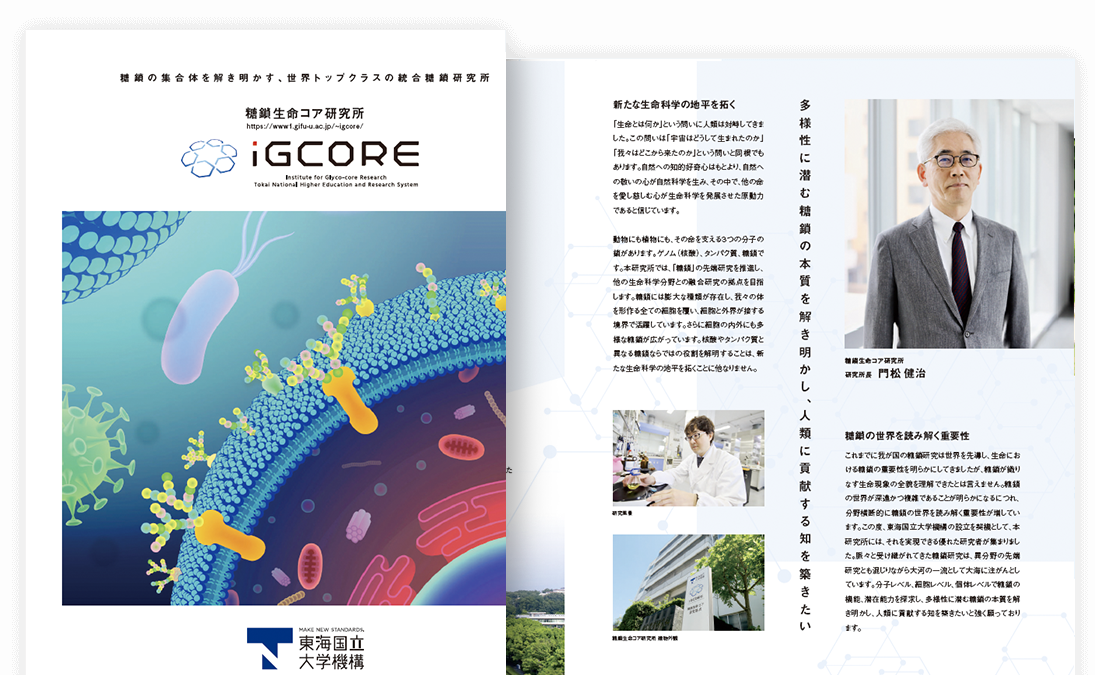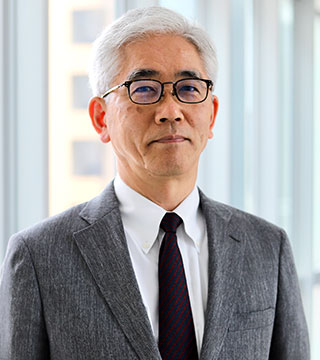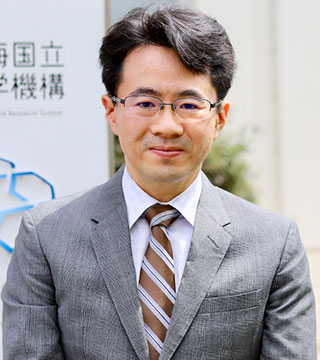MEMBER
Members List
Chihiro Sato
Vice-DirectorChairMolecular Physiology Division
Nagoya University
iGMED
- Research interests
- PolySia, Sialic acid, molecular interaction, acidic polysaccharide, disease, mental disease, cancer
- Research subject
- Glycans cover cell surface in all organisms and maintain cellular homeostasis by mediating cell-cell and cell-extracellular communication. Abnormal glycan structures cause various dysfunctions and diseases (mental disease, cancer, etc). We conduct interdisciplinary research covering medical, pharmaceutical and agricultural sciences, aiming at contributing to better health, environment and food, by understanding and regulating glycan functions at molecular, cellular, tissue, and individual levels. In particular, we conduct basic research on the structures and functions of PolySia as well as applied science such as development of probes. We try to conduct research from wide viewpoints, covering from evolution to disease.
Tetsuya Okajima
Division headMolecular Physiology Division
Nagoya University
iGMED
- Research interests
- O-GlcNAc, mass spectrometry, disease
- Research subject
- We have so far identified novel glycans and revealed their functions, by focusing on Notch receptor which is involved in tumors and neurodegenerative diseases. We try to further understand glycan functions and develop novel therapeutic strategies targeting glycans. In addition, by using advanced recent techniques for analyzing glycopeptide with mass spectrometry, we will conduct medical and drug discovery studies.
Hiroshi Abe
Molecular Physiology Division
Nagoya University
iGMED
- Research interests
- medicinal chemistry, nucleic acid chemistry, mRNA, DNA, biotechnology
- Research subject
- We focus on drug discovery and biotechnology technologies based on nucleic acid chemistry. To date, we have achieved the world's first complete chemical synthesis of mRNA. Using this technology, highly active mRNA vaccines are developed. We also develop tissue-specific delivery technology by using sugar functions, genome-sized DNA synthesis technology, and synthetic biology of useful microorganisms leading to material production.
Takayuki Uchihashi
Molecular Physiology Division
Nagoya University
iGMED
- Research interests
- High-speed atomic force microscope (AFM), single molecule measurement, dynamics, protein
- Research subject
- By using HS-AFM, we develop methods for analyzing single molecule dynamics. Using single molecule imaging, we aim to elucidate the mechanisms of how proteins exert their functions.
Atsunori Oshima
Molecular Physiology Division
Nagoya University
iGMED
- Research interests
- Structural biology, membrane protein, cryo-EM, cell-cell communication, membrane lipid
- Research subject
- To understand signal transduction via plasma membrane, we mainly analyze membrane proteins. In detail, we try to reveal open-close mechanisms of channels, recognition mechanisms of ligands or compounds by pumps and GPCRs. We also try to develop and optimize techniques of sample preparation for high-resolution structural analysis using cryo-EM. We use methods for reconstitution of membrane proteins into lipid nanodiscs for structural analysis.
Tomoo Ogi
Molecular Physiology Division
Nagoya University
iGMED
- Research interests
- Genome analysis in disease, genome instability
- Research subject
- We use cutting-edge techniques, such as next-generation genome analysis and next-generation transcriptomics. We aim to identify novel gene variants responsible for diseases and to reveal molecular functions of gene variants. We also try to elucidate pathology using disease model mice.
Takahiro Shibata
Molecular Physiology Division
Nagoya University
iGMED
- Research interests
- Oxidative stress, posttranslational modification, food component, extracellular vesicle, bioactive lipid
- Research subject
- We analyze the mechanisms of activity of food components for preventing lifestyle-related diseases. In addition, we search for disease markers focusing on oxidative stress-induced posttranslational modifications and extracellular vesicles.
Midori Shimada
Molecular Physiology Division
Nagoya University
iGMED
- Research subject
- Our laboratory conducts integrated research to elucidate the regulatory mechanisms of gene expression and protein degradation, which are fundamental to biological phenomena, and to identify therapeutic targets and develop strategies for cancer treatment based on information from life science databases.
Yoshikatsu Matsubayashi
Molecular Physiology Division
Nagoya University
iGMED
- Research interests
- Arapidopsis thaliana, O-linked glycan, arabinose, arabinogalactan protein
- Research subject
- Two types of protein glycosylation are known, N-linked and O-linked glycans. The basic biosynthetic mechanisms of the N-glycans are similar between plants and animals. On the other hand, non-reducing end sugars and amino acids to which O-glycans are attached differ greatly between plants and animals, and it is known that arabinose and galactose are added to hydroxyproline (Hyp) in plants. We discovered the glycosyltransferases involved in Hyp O-arabinosylation and galactosylation and investigate various physiological functions of O-glycans in plants by phenotypic analysis of the strains deficient in these enzymes.
HIroaki Wake
Molecular Physiology Division
Nagoya University
iGMED
- Research interests
- in vivo two photon holographic microscope, glia, multi-cellular dynamics
- Research subject
- Higher brain functions such as learning, memory, and emotion are efficiently expressed by individual neuronal activity in multiple brain regions performing spatiotemporally organized activities and creating descriptive neuronal population activities (= neural circuit activities). We are using in vivo imaging to visualize the structure and function of neurons and glial cells required for higher brain functions and to elucidate the changes in these physiological functions and pathological conditions.
Akinori Nakamura
Molecular Physiology Division
Nagoya University
iGMED
Yu Nakagawa
Molecular Physiology Division
Nagoya University
iGMED
- Research interests
- Natural compound, carbohydrate recognition, antibiotics, molecular design, analysis of molecular interaction
- Research subject
- We focus on natural small compounds that bind to biologically or pathologically important glycans, and we analyze the molecular mechanisms for the binding. Based on this knowledge, we develop molecular tools for glycoscience and drug leads targeting glycans by chemical modification of the natural products.
Kwok Kei MAK
Molecular Physiology Division
Nagoya University
iGMED
- Research interests
- Psychiatric epidemiology, meta-analysis, machine learning
- Research subject
- Genome-wide association studies (GWAS) of N-glycome profile changes in brain disorders and diabetes
Nao Yamakawa
Molecular Physiology Division
Nagoya University
iGMED
- Research interests
- Glycoconjugate structural analysis, Glycan Modification, Sialic Acid, Glycan diversity studies
- Research subject
- My research centers on developing and applying advanced analytical techniques—integrating mass spectrometry, chromatography, and analytical chemistry—to elucidate the structures of complex glycans and glycoconjugates. I am dedicated to uncovering novel and elusive glycan architectures and advancing our understanding of their diverse biological functions.
Yuji Kondo
Molecular Physiology Division
Nagoya University
iGMED
- Research interests
- Tissue expression profiling of glycosyltransferases, Reverse genetics, Click-chemistry, single cell RNA analysis, super resolution microscope
- Research subject
- By using advanced technologies, I try to establish a system that allows us to analyze endogenous glycan structures and functions on particular proteins at single cell level.
Yuko Tashima
Molecular Physiology Division
Nagoya University
iGMED
- Research interests
- O-glycan, Proteostasis, NOTCH
- Research subject
- We aim to elucidate the mechanism of O-glycan-mediated proteostasis (maintaining proper protein expression). We focus on NOTCH receptor, which is heavily O-glycosylated and plays key roles in the NOTCH signaling pathway essential for cell differentiation and homeostasis.
Masaya Hane
Molecular Physiology Division
Nagoya University
iGMED
- Research interests
- PolySia, sialic acid, molecular interaction, anti-glycan antibody
- Research subject
- Aiming at research from a broad perspective ranging from evolution to disease, we conduct basic research on the structures and functions of polysialic acid (Polysia), their relationship to disease, and applied research such as development of probes.
Kenji Kadomatsu
DirectorBioregulation of Cell and Organism Division
Nagoya University
- Research interests
- Glycan, synapse, axon, neuroblastoma, renal disease
- Research subject
- We aim to elucidate the mechanisms by which glycans regulate physiological functions in the nervous system, especially synaptogenesis and axon elongation. We also study a wide range of molecular pathology, including neuroblastoma, a pediatric solid tumor, and metabolic diseases such as renal diseases.
Ken Kitajima
Division headBioregulation of Cell and Organism Division
Nagoya University
iGMED
- Research interests
- Integrated glycobiology, glycan metabolism, glyco-developmental biology, defective sialic acid metabolism and disease, evolution of sialic acid metabolism
- Research subject
- Disruption of genes for glycan metabolism often does not affect cell survival, whereas that causes various pathological conditions and death at the organism level. To understand glycan-related biological phenomena at the molecular level, we need to take an integrated glycobiology approach encompassing molecules, cells, and organisms. We particularly focus on sialic acid metabolisms. Using reverse genetics in medaka fish, we modify genes for sialic acid metabolism to alter domain functions, complex formation, and subcellular localization. We observe the individual phenotypes, as well as conduct integrated omics analysis involving genes, proteins, and glycans.
Masashi Ikeda
Bioregulation of Cell and Organism Division
Nagoya University
iGMED
- Research interests
- Psychiatric Disorders, Genomic Analysis, Pharmacogenomics
- Research subject
- We are conducting research to identify disease susceptibility genes, which can be a stepping stone for the identification of the mechanisms of psychiatric disorders.
In particular, we aim to take an approach that utilizes the results of genomic research for clinical interpretation by conducting analyses that take into account polygenic structures.
In addition, we will promote pharmacogenomic research aimed at identifying genes related to drug reactivity and side effects, and aim to implement genomic medicine.
Masahisa Katsuno
Bioregulation of Cell and Organism Division
Nagoya University
iGMED
- Research interests
- Motor neuron disease, Parkinson’s disease, dementia with Lewy bodies, oligonucleotide therapy, protein aggregation
- Research subject
- We focus on the pathogenesis and treatment of motor neuron diseases and Lewy body diseases (Parkinson's disease and dementia with Lewy bodies). For the pathogenesis, we mainly use mouse models and patient samples to elucidate the molecular pathogenesis at very early stages of the disease by omics and neuronal circuit analysis. For treatment, we administer small compounds and nucleic acid drugs to animal models and analyze the efficacy. For Lewy body diseases, we conduct a cohort study of high-risk individuals before the onset of the disease, and conduct a prospective longitudinal analysis of neurofunctional assessment, imaging, and blood biomarkers.
Yutaka Kondo
Bioregulation of Cell and Organism Division
Nagoya University
iGMED
- Research interests
- Epigenetics, non-coding RNA, cancer
- Research subject
- The interactions among proteins, DNA, and RNA in the cell nucleus cannot be explained simply by random molecular diffusion, and some regulatory mechanism probably promotes the interactions efficiently and specifically. We study the mechanism by which RNA and epigenome-related proteins are regulated by chemical modifications, including glycosylation, in cancer cells and contribute to carcinogenesis.
Hiroshi I. Suzuki
Bioregulation of Cell and Organism Division
Nagoya University
iGMED
- Research interests
- Cancer, genome, RNA, glycan, data science
- Research subject
- Various glycosylation abnormalities have long been known in cancer. By integrating large-scale data sets of genomic aberrations, RNA expression, and CRISPR-based essential gene screening in cancer, we build a platform to analyze the differences in mechanisms of glycan regulation between normal and cancer cells, and the relationship between cancer and glycans.
Masahiko Hibi
Bioregulation of Cell and Organism Division
Nagoya University
iGMED
- Research interests
- Zebrafish, medaka, genome editing, neurogenesis, neural function
- Research subject
- Using small fish such as zebrafish and medaka, we analyze the functions of genes involved in neurogenesis and also analyze neural circuits involved in higher order neuronal activity, through genome editing and generation of transgenic fish.
Koji Yamanaka
Bioregulation of Cell and Organism Division
Nagoya University
iGMED
- Research interests
- Neurodegeneration, dementia, glia, organelle, quality control of protein
- Research subject
- We generate animal and cellular models and aim to elucidate the pathology of neurodegenerative diseases and dementia and to develop therapy. In particular, we conduct research to elucidate pathology from the viewpoints of neuron-glia linkage, organelle linkage (mitochondria and endoplasmic reticulum), and abnormalities in protein and RNA metabolism.
Norio Ozaki
Bioregulation of Cell and Organism Division
Nagoya University
iGMED
- Research interests
- Mental disease, genome, model mouse, iPS cell, postmortem brain
- Research subject
- We investigate the pathogenesis of mental disorders by identifying genomic variants that are strongly associated with the onset of mental disorders. Specifically, we investigate molecular and neural circuit pathologies using iPS cells and postmortem brains derived from patients with genomic variants associated with the onset of mental disorders, and mouse models mimicking the genomic variants. We focus on variants of glycan-related genes and the involvement of glycans in neural development and neural circuit formation, aiming to elucidate the pathophysiology of mental disorders and develop diagnostic and therapeutic methods based on the pathophysiology of mental disorders.
Yoichiro Harada
Bioregulation of Cell and Organism Division
Nagoya University
iGMED
- Research interests
- Cancer, Diseases, Microenvironment, low glucose, metabolism, monosaccharides, glycans
- Research subject
- We aim to develop innovative seeds for drug discovery by elucidating the mechanisms by which living organisms use sugars and sugar chains to control biological phenomena and the mechanisms of diseases caused by the failure of these mechanisms.
Fumitaka Osakada
Bioregulation of Cell and Organism Division
Nagoya University
iGMED
- Research interests
- Brain, neural circuit, vision, pharmacology, viral vector, imaging, ES/iPS cell, organoid
- Research subject
- Many animals, including humans, recognize the external world based on sensory input and select appropriate actions. How is such functionality achieved by information processing in the brain and how is that processing impaired in neurological and psychiatric diseases? Our goal is to elucidate these questions in order to develop new treatments for neurological and psychiatric disorders. We conduct multidisciplinary research combining physiology, anatomy, and pharmacology with molecular biology, developmental biology, virology, behavioral psychology, optics, and informatics.
Di Wu
Bioregulation of Cell and Organism Division
Nagoya University
iGMED
- Research interests
- CMP-sialic acid synthetase, sialylation, medaka
- Research subject
- My research targets on the CMP-sialic acid synthetase (CSS), which is prerequisite for the expression of sialic acid (Sia)-containing glycoproteins and glycolipids, because CSS only provides all kinds of sialyltransferases with a donor substrate CMP-Sia. My final goal is to understand the biological significance of CSS at the organism level. For this purpose, medaka (Oryzias latipes) fish was chosen as a vertebrate model, various mutant medaka with a single amino acid substitution in CSS and specific CSS-domain knock-out medaka were established. To understand how CSS regulates sialylation through specific amino acids and domains at the organism level, morphological changes and sialylation changes in these CSS mutant medaka strains are studied by biochemical, histological and glycomic analyses. In addition, to reveal whole glycomes of medaka, sialomic analysis as well as total glycomic analysis are performed using the fluorometric HPLC and MS technologies.
Kazuya Izumi
Bioregulation of Cell and Organism Division
Nagoya University
iGMED
- Research interests
- Cancer, Inflammation, Metabolism, Cell biology, Glycans
- Research subject
- We aim to develop develop innovative therapeutic modalities targeting glycans and glycometabolism by elucidating biological functions regulated by sugars and glycans.
Yusuke Matsui
Division headSystems Biology Division
Nagoya University
iGDATA
- Research interests
- Statistical science, informatics, computational biology, computational neuroscience, bioinformatics
- Research subject
- Life science is generating huge and complex data at an unprecedented rate. Various and heterogeneous big data are being accumulated, including next-generation sequencing technology, mass spectrometry to capture proteome and post-translational modifications, and sensing technology to capture imaging and biological information. It is quite important to utilize such large-scale big data in life science in order to reveal the mechanisms of unknown biological systems. Our mission is to develop useful mathematical modeling and data analysis methods in life science.
Motonori Ota
Systems Biology Division
Nagoya University
iGDATA
- Research interests
- Structure bioinformatics, protein tertiary structure, naturally denatured protein, protein-protein interaction network
- Research subject
- Our research focuses on bioinformatics related to protein conformations and how interactions and conformational changes lead to functions. We also develop algorithms (methods) for data analysis and constructing databases.
Naoki Honda
Systems Biology Division
Nagoya University
iGDATA
- Research interests
- Data-Driven Biology, Machine Learning, Mathematical Modeling
- Research subject
- By making full use of machine learning, we are developing mathematical modeling research rooted in data. We are also conducting single-cell omics analysis and pathological analysis.
Kensaku Mori
Systems Biology Division
Nagoya University
iGDATA
Morten Thaysen-Andersen
Systems Biology Division
Nagoya University
iGDATA
- Research interests
- Clinical glycoproteomics, Glycoimmunology, N-glycosylation, Cancer, Sepsis, Innate immunity
- Research subject
- The Glycoproteomics Lab@iGCORE develops and applies cutting-edge LC-MS/MS-based methods for quantitative and comparative glycoproteomics of human biospecimens to holistically explore elusive roles of protein N-glycosylation in human glycobiology with a particular focus on the innate immune system. The group uses high throughput glycoproteomics methods compatible with large clinical sample cohorts to study how the N-glycoproteome is remodelled with aberrant physiology and with various disorders including cancer, inflammation and infectious diseases.
Hiroyuki Kaji
Systems Biology Division
Nagoya University
iGDATA
- Research interests
- Glycoproteomics, glycome, proteome, liquid chromatography, mass spectrometry
- Research subject
- We develop and apply techniques for comprehensive analysis of post-translational modifications of proteins, especially glycosylation, using mass spectrometry. We systematically analyze the structures of glycans attached to the glycosylation sites on each glycoprotein in biological samples such as body fluids, cells, and tissues, and when and how these glycans change. By obtaining this information, we hope to contribute to basic research such as elucidation of the involvement of glycans in biological phenomena as well as applied research on development of diagnostic markers and therapeutic targets presenting the altered glycans.
Jennifer Jean Kohler
Systems Biology Division
Nagoya University
iGDATA
- Research interests
- chemical biology, fucose, glycolipids, intestinal epithelia, mucus, infectious disease, genetic disorders of glycosylation
- Research subject
- The complex structures and properties of glycans are critical to their myriad biological functions. However, this complexity leads to technical challenges. To tackle these challenges, our research team has created chemical biology methods aimed at understanding glycan function. In particular, we developed photocrosslinking sugar analogs that can be metabolically incorporated into cellular glycoconjugates and used to covalently capture transient glycan-mediated interactions. Using one of these photocrosslinking sugars, we discovered that cholera toxin recognizes fucosylated glycoconjugates displayed on the surface of human intestinal epithelial cells. In current work, we are continuing to develop and apply chemical biology tools to problems in glycoscience. Additionally, we are probing the mechanisms that regulate production of glycoconjugates that comprise the mucosal layer of the intestinal epithelial. Our studies have relevance to infectious disease, cancer biology, and genetic disorders of glycosylation.
Jun-ichi Furukawa
Systems Biology Division
Nagoya University
iGDATA
- Research interests
- Glycomics, glycoprotein, glycosphingolipid, glycosaminoglycan, free oligosaccharide, SALSA method
- Research subject
- Cell surface is covered with various glycans whose levels and structures are known to change dramatically with cellular conditions and the environments. Various classes of glycans are present, including complex glycoconjugates such as glycoproteins and glycolipids, glycosaminoglycans such as heparan sulfate and chondroitin sulfate, and free oligosaccharides. We have developed a technique for comprehensive analysis of glycans and conduct total glycomics research on blood, cells, and tissues.
Rebeca Kawahara
Systems Biology Division
Nagoya University
iGDATA
- Research interests
- Clinical glycoproteomics, multi-omics, data integration, glycosignatures, diseases
- Research subject
- The focus of my research at the Glycoproteomics Lab@iGCORE consists in developing and applying advanced mass spectrometry-based glycoanalytical methods and multi-omics data integration systems in large cohorts of clinical samples to enable comprehensive and holistic profile of the human glycoproteome and the discovery of new glycosignatures associated with human diseases.
Ryuji Kato
Systems Biology Division
Nagoya University
iGDATA
- Research interests
- Image analysis, cell morphology, cell adhesion, cell quality control
- Research subject
- We aim to develop cell image analysis technique for cell quality control and develop culture scaffold materials for controlling cell quality. For this purpose, we label glycolipids in cell membranes and search for glycan binding peptides in cell membranes.
Hisatoshi Hanamatsu
Systems Biology Division
Nagoya University
iGDATA
- Research interests
- Glycan analysis, mass spectrometry, sialic acid
- Research subject
- To easily analyze various classes of complex glycoconjugate glycans in cells, tissues, and body fluids, we focus on the development of new subglycome analysis techniques, such as a chemical approach to identify sialic acid linkage patterns by mass spectrometry, a chemical cleavage method for O-type glycans without useful cleavage enzymes, and a new separation method for glycosaminoglycan disaccharides, to elucidate various glycan functions.
Shiori Go
Systems Biology Division
Nagoya University
iGDATA
- Research interests
- Glycolipid, glycoproteomics, intracellular trafficking
- Research subject
- We focus on the function of membrane microdomain in various biological phenomena on brain. In membrane microdomain, glycosphingolipids and specific glycoproteins are enriched, interact with each other, and regulate various biological functions. We are particularly interested in the elucidation of comprehensive functions of microdomains glycosylation in neural functions. We analyze structure of glycosphingolipids and glycans of glycoproteins in microdomain using methods for glycoproteomics and glycosphingolipids analysis.
Bingyuan Zhang
Systems Biology Division
Nagoya University
iGDATA
- Research interests
- Statistical Science, Machine Learning, Bioinformatics
- Research subject
- Massive amounts of data from innovative technologies such as sequencing, mass spectrometry techniques present new challenges and exciting opportunities. My mission is to develop useful mathematical tools based on state-of-the-art statistical and machine learning techniques to utilize these large-scale heterogeneous real-world data to discover new mechanisms in unknown biological systems and ultimately contribute to scientific discovery.
Akihiro Fujita
Systems Biology Division
Nagoya University
iGDATA
Huang Chengcheng
Systems Biology Division
Nagoya University
iGDATA
- Research interests
- Chemical glycobiology, Sialic acid, free oligosaccharides, serum
- Research subject
- My work at iGCORE focuses on incorporating chemically labeled glycan analogs into animal cells for in vivo functional studies of glyconjugates. In particular, I use photocrosslinking sialic acid analogs so that the modified glycans can be used to covalently capture transient glycan-mediated interactions. I also aim to develop novel click chemistry method for the fluorescent labeling of sialic acid in animal cells. My research interests also include the structural analysis of free oligosaccharides in serum and their potential biological functions.
Priya DIPTA
Systems Biology Division
Nagoya University
iGDATA
- Research interests
- Glycoimmunology, Molecular Biology, Immunology, Cancer, Pharmacology, N-glycosylation
- Research subject
- I have joined the Glycoproteomics Lab@iGCORE to contribute towards the HGA goal by utilizing various analytical methods. My research focuses on mapping glycosylation in immune cells and the tumour microenvironment, aiming to uncover its functional implications in inflammation and cancer biology.
Yann Guerardel
Division headStructural Analysis Division
Gifu University
iGDATA
- Research interests
- Glycomics、Structural analysis、Host-pathogen interactions、NMR、Mass Spectrometry
- Research subject
- I am a senior researcher for CNRS (Lille University, France) and an Invited Professor at iGCORE (Gifu University, Japan). I focus my research on the structure to function relationships of complex carbohydrates, from microorganisms to higher eukaryotes, mostly in the context of host-pathogen interaction. My main objective is to understand how the glycans from both host and pathogen fine tune the infectious process and how they may be used as diagnosis or therapeutic tools, with a keen interest for mycobacterial, fungus and viral infections. To reach this goal, I integrate a wide range of scientific approaches including synthetic chemistry, structural analysis using NMR spectroscopy and mass spectrometry, structural biology of proteins and enzymology.
Kenichi G. N. Suzuki
Division headGlyco-Molecular Science Division
Gifu University
iGMOL
- Research interests
- Single molecule imaging, super resolution imaging, glycolipid, GPI-anchored protein, signal transduction
- Research subject
- Using single molecule and super-resolution imaging techniques, we aim to elucidate the organization and functions of cell membranes. In particular, we aim to elucidate the roles of glycans in dynamic microdomain formation on living cell membranes and in the promotion and regulation of signal transduction.
Hiromune Ando
Vice-DirectorGlyco-Molecular Science Division
Gifu University
iGMOL
- Research interests
- Carbohydrate chemistry, chemical biology, sialic acid, molecular probe, virus infection
- Research subject
- We particularly focus on the chemical synthesis of glycans containing sialic acid, which is a sugar present on the cell surface. Sialic acid-containing glycans are closely related to diseases, such as viral invasion and malignant transformation of cancer. We have developed a powerful method for chemical synthesis and succeeded in synthesizing more than 300 kinds of sialic acid-containing glycans. Recently, we have succeeded for the first time in the world in visualizing dynamically moving glycans in the plasma membrane of living cells through interdisciplinary research with biophysics. By further advancing such research, we aim to unveil the real picture of glycans, which has not been possible to observe, and to understand the functions of glycans in biological processes.
Yasuhiko Kizuka
ChairGlyco-Molecular Science Division
Gifu University
iGMOL
- Research interests
- Glycosyltransferase, N-glycan
- Research subject
- We focus on glycosyltransferases which form branching structures of N-glycans and try to reveal the regulation mechanisms of their activity and disease relevance. We take a biochemical approach in combination with structural biology, chemistry, and glycomics. We have revealed that deficient mice for a specific glycosyltransferase show the improved Alzheimer’s disease pathology, and tertiary structures and acceptor protein selectivity of cancer-related glycosyltransferase GnT-V and diabetes-related GnT-IV. Moreover, we develop glycan probes and glycosyltransferase inhibitors.
Masato Ikeda
Glyco-Molecular Science Division
Gifu University
iGMOL
- Research interests
- Supramolecular chemistry, nanobiomaterial, chemical biology
- Research subject
- We design and synthesize new hybrid molecules that have multiple molecules as modules, including glycans. We study their biological functions, construction of nanostructures by molecular assembly, and generation of biofunctional materials.
Akihiro Imamura
Glyco-Molecular Science Division
Gifu University
iGMOL
- Research interests
- Organic synthesis, glycochemistry, glycolipids, glycosidase, galectin, human milk oligosaccharides (HMOs)
- Research subject
- We focus on the chemical synthesis of biologically relevant glycans and glycan-related protein inhibitors. Our focus spans a wide range of glycans, from monosaccharide to oligo- and polysaccharides. We believe that our research based on chemistry contributes significantly to the advancement of the field of glycoscience.
Natsuhisa Oka
Glyco-Molecular Science Division
Gifu University
iGMOL
- Research interests
- Franoside, stereoselective synthesis, domino reaction, inositol, carbasugar
- Research subject
- We develop efficient methods for the synthesis of various chiral cyclopentenes and cyclohexenes by domino reaction using heteroarylsulfones derived from sugars. We will explore efficient routes to convert the resulting cyclopentenes and cyclohexenes into useful compounds such as bioactive natural products, inositol derivatives, and carbasugars.
We also develop a highly stereoselective furanosylation reaction using iodinated sugars as glycosyl donors. This reaction proceeds with complete 1,2-cis selectivity and efficiently yields stereochemically pure furanosides. We aim to use this reaction for efficient synthesis of cell surface glycans.
Masayasu Taki
Glyco-Molecular Science Division
Gifu University
iGMOL
- Research interests
- Fluorescent Probes, Chemical Biology, Fluorescence Imaging, Organelles, Lipid Metabolism
- Research subject
- We aim to create fluorescent probes to visualize the structure and characteristics of cells and various events that occur in cells, and to understand cell functions through fluorescence imaging. Recently, focusing on lipid metabolism, we have succeeded in visualizing the behavior of fatty acids and fat droplets in cells and the characteristics of lipid membranes in real time while the cells are alive. We would like to contribute to the development of glycan research by creating methods for quantitative analysis of the effects of glycans on cellular function and new molecular tools for directly visualizing arbitrary glycans.
Morihisa Fujita
Glyco-Molecular Science Division
Gifu University
iGMOL
- Research interests
- Endoplasmic reticulum, intracellular trafficking, GPI-anchored protein, glycan remodeling
- Research subject
- We focus on the "life cycle of glycoproteins (biosynthesis, intracellular transport, and degradation)" and aim to elucidate the regulatory mechanisms of the life cycle of glycoproteins. In particular, we analyze the biosynthesis and intracellular dynamics of glycosylphosphatidylinositol (GPI)-anchored proteins and paucimannose-containing glycoproteins using genetic, biochemical, and cytological methods. Furthermore, we aim to develop tools to visualize glycan metabolic pathways and to construct glycan-modified host cells, for producing biopharmaceutical glycoproteins.
Tomio Yabe
Glyco-Molecular Science Division
Gifu University
iGMOL
- Research interests
- Proteoglycan, heparan sulfate, sulfation pattern, dietary fiber, intestinal epithelial cell
- Research subject
- We aim to elucidate the regulatory mechanism of physiological actions of heparan sulfate by controlling sulfation patterns in heparan sulfate. In particular, we focus on the mechanism of action of intestinal epithelial cells that respond specifically to the polysaccharide structure of dietary fiber. We analyze the mechanism by which heparan sulfate structures at the basement membrane are regulated by interaction between cell surface proteins and dietary fiber.
Hide-Nori Tanaka
Glyco-Molecular Science Division
Gifu University
iGMOL
- Research interests
- Glycan, ADP ribose chain, selective synthesis, protection-free synthesis, chemoenzymatic synthesis
- Research subject
- Based on synthetic chemistry, we aim to unveil and manipulate the biological functions of glycans and ADP-ribose chains, which are post-translational modifications of proteins.
Synthetic chemistry is extremely important in life science research because it can provide molecules that are structurally homogeneous and pure, but the synthesis of these molecules requires a great deal of effort and time. This has been the bottleneck in research on both molecules. Therefore, I work on the rapid and efficient synthesis of glycans and ADP-ribose chains by using selective synthesis, protection-free synthesis, and chemoenzymatic synthesis. Our unique synthetic chemistry will break through the bottleneck and dramatically advance life science focusing on both molecules.
Kazuki Nakajima
Structural Analysis Division
Gifu University
iGMOL
- Research interests
- Glycoproteomics, nucleotide sugar, automatic analysis
- Research subject
- We develop analytical techniques for rapid glycoproteomics and metabolomics to elucidate metabolic relationships between glycoproteins and glycans, and nucleotide sugars. High-throughput methods using chromatography and mass spectrometry will be established to promote analysis of large cohorts. In particular, by integrating robotics and systems through collaboration, we aim to fully automate plasma glycoproteomics, which has been difficult to achieve so far. In the future, we hope to discover glycan-related biomarkers for neurodegenerative and renal diseases and propose a new diagnostic system.
Yuichi Abe
Glyco-Molecular Science Division
Gifu University
iGMOL
- Research interests
- proteogenomics, antigen-antibody profiling, post-translational modified proteomics, glycan antigens and glycan antibodies, omics medicine
- Research subject
- I have been involved in the development of clinical proteome analysis technology and its application to translational research. As a unique measurement system, we have realized high-sensitivity proteome analysis of autoantigens contained in immune complexes and their high throughput, and applied them to the search for antigens derived from cancer-specific proteins. Currently, we are further expanding antigen-antibody profiling technology, such as spatiotemporal monitoring of immune complexes and identification of glycan antigens and glycan antibodies. In the future, we would like to contribute to the development of iGCORE by organically integrating our proprietary analysis technology with disease omics obtained from next-generation sequencers, and promoting our own glycan research, such as the search for glycan antigens and glycan antibodies that can be indicators of humoral immune activity.
Naoko Komura
Glyco-Molecular Science Division
Gifu University
iGMOL
- Research interests
- Sialic acid, ganglioside, lipid rat
- Research subject
- We are engaged in chemistry study on sialic acid-containing glycans and chemical biology study using the synthesized glycans. In particular, we focuse on the functions of sialic acid-containing glycolipids (gangliosides) in lipid rafts, which are responsible for signal transduction on the cell membrane.
Naoya Suzuki
Glyco-Molecular Science Division
Gifu University
iGMOL
Kaori Tanaka
Division headCooperative Research Facility Division
Gifu University
iGMOL
- Research interests
- Infectious disease, clinical bacteria, anaerobic bacteria
- Research subject
- Our research focuses on the clinical bacteriology of commensal anaerobic bacteria which constitute the major endogenous flora of humans and animals. Endogenous infections involving commensal species are often mixed infections with facultative anaerobes, forming a pathogroup. The major Gram-negative rods tend to be multidrug-resistant and are thought to contribute directly or indirectly to the pathogenesis of the disease, but many aspects of the pathogenesis remain unresolved. This is an obstacle to appropriate clinical testing and chemotherapy. Epidemiologic studies of isolates and these drug resistances are examined, as well as the pathogenic significance of the biased anaerobes.
Haruhisa Suga
Cooperative Research Facility Division
Gifu University
iGMOL
- Research interests
- Pathogenic gene, molecular diagnostics, drug resistance mechanisms, mycotoxins, genetic diversity
- Research subject
- In recent years, food safety, food shortages on a global scale, and the environmental impact of pesticides have become issues. In order to solve these problems, it is important to properly prevent crop diseases, and in particular, a deep understanding of the properties of pathogenic fungi is required. Our laboratory aims to elucidate the molecular mechanisms of pathogenicity, pesticide resistance, and fungal toxin production, and genomic evolution mechanisms in Fusarium fungi, which are major plant pathogens, toxin-producing fungi, and opportunistic infectious pathogens of humans.
Hideki Nikami
Cooperative Research Facility Division
Gifu University
iGMOL
- Research interests
- Animal experiment, animal welfare, developmental engineering, brown fat, sugar metabolism
- Research subject
- Education and development of all aspects of animal experiments (procedures, anesthesia, facility operation, laws and guidelines, animal welfare, etc.). The aim is to develop facility operation methods, animal experiments, and the handling of experimental animals in accordance with international guidelines and national laws.
In addition, we aim to elucidate the sugar metabolism and intracellular mechanisms of obesity and diabetes using genetically modified animals. We particularly focus on brown fat.
Shigeo Takashima
Cooperative Research Facility Division
Gifu University
iGMOL
- Research interests
- Lipids, fatty acids, adrenoleukodystrophy, peroxisome disease, inherited metabolic disease
- Research subject
- Our laboratory studies the functional role of fatty acids in individual development and disease, by investigating a human genetic disease (peroxisome disease) in which fatty acid metabolism is impaired. Fatty acids are one of the important biomolecules, and not only as a material for membranes but also play important physiological roles, such as regulating cellular functions and being used as a source of cellular energy. Our bodies contain more than 100 types of fatty acids in different lengths and shapes. We investigate the significance of the existence of these diverse fatty acids and the mechanisms by which their metabolic changes cause various pathological conditions.
Yuji O. Kamatari
Cooperative Research Facility Division
Gifu University
iGMOL
- Research interests
- Biophysics, structural biology, protein science, molecular interaction analysis, nuclear magnetic resonance spectroscopy (NMR), surface plasmon resonance (SPR), logical drug discovery, neurodegenerative diseases, antibodies, protein expression
- Research subject
- Using various structural biology and biophysical techniques such as NMR and SPR, we analyze the structures and interaction of proteins and glycans to elucidate the biological phenomena they are involved in. Furthermore, we aim to control them for drug discovery.
Takatsugu Goto
Cooperative Research Facility Division
Gifu University
iGMOL
- Research interests
- Anaerobic bacteria, Bacteroides, drug resistance mechanisms, whole genome analysis
- Research subject
- We are engaged in research on drug resistance mechanisms of Bacteroides (especially Bacteroides fragilis), an anaerobic bacterium commensal to the intestinal tract and sometimes isolated from intra-abdominal infection colonies. In particular, we aim to elucidate the mechanism of carbapenem resistance in this species using comprehensive methods such as whole genome analysis
Tomoya Sawamura
Cooperative Research Facility Division
Gifu University
iGMOL
- Research interests
- Colorectal motility, Defecation disorder, Central nervous system, Autonomic nervous system, Descending pain regulatory system, Irritable bowel syndrome, Pathological model animal
- Research subject
- I am studying the mechanism of colorectal motility regulated by the central nervous system and the relationship of this mechanism to defecation disorders. It has been shown that descending pain regulatory system is involved in the central regulation of colorectal motility, so pain modulation and regulation of colorectal motility seem to share a common neural pathway. The aim of this study is to elucidate the pathophysiology of defecation disorders, such as irritable bowel syndrome (IBS), in which abdominal pain and defecation disorders coexist.
Masahiro Hayashi
Cooperative Research Facility Division
Gifu University
iGMOL
- Research interests
- Obligate anaerobic bacteria, phylogenetic classification, infectious disease
- Research subject
- The major focus of our laboratory is on the bacteriology of the obligate anaerobes that comprise the major commensal flora of humans. In recent years, advances in science and technology have led to a restructuring of the bacterial classification system. Our research focuses on drug resistance genes in especially so-called "pathogenic bacteria" that are harmful to humans. We also provide assistance in the identification of bacterial species by genetic approaches to cases from nearby hospitals and other facilities that have difficulty in determining the species of bacteria.
Jun Hirabayashi
Division headResearch Promotion office
Nagoya University
- Research interests
- Project manager
Shinji Itoh
Research Promotion office
Gifu University
Shinji Go
Research Promotion office
Nagoya University
Fumihiko Shinoda
Research Promotion office
Nagoya University
Yoriko Miyake
Research Promotion office
Nagoya University
Airi Mori
Research Promotion office
Nagoya University
Hiroki Domae
Research Promotion office
Nagoya University
Contact us by phone

052-789-5365
( +81-52-789-5365 )
Weekday, 9:00-17:00
Contact us







